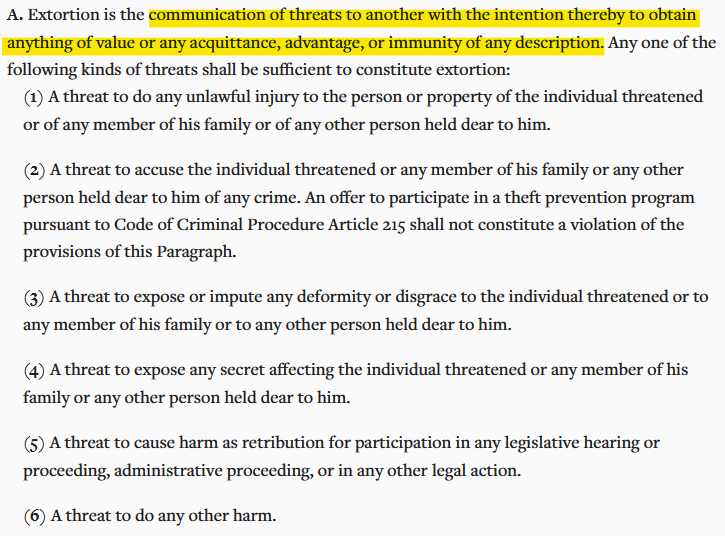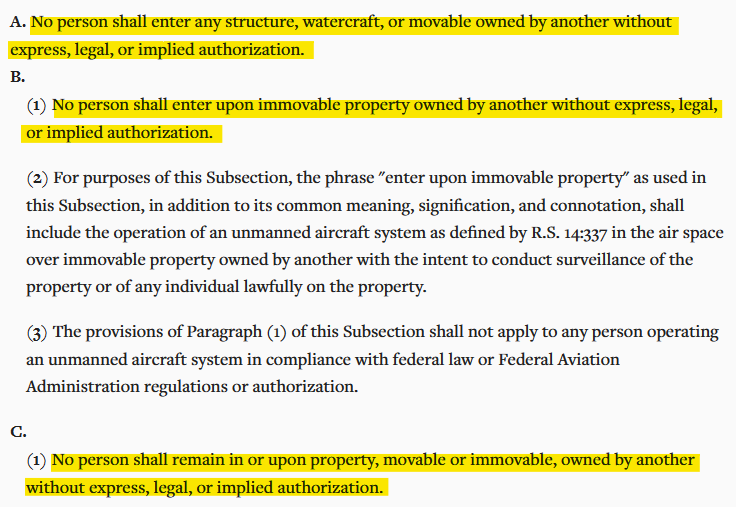Is Doxxing Illegal in Louisiana?
Laura Martisiute
Reading time: 6 minutes

Table of Contents
If you live in Louisiana and are concerned about your information being shared online without your permission, you may wonder: Is doxxing illegal in Louisiana?
In this guide, we’ll dive into Louisiana’s legal code to determine whether or not doxxing is legal. We’ll also provide insight into doxxing-related crimes and how they’re handled in the state.
Is Doxxing Illegal in Louisiana?
No. The act of doxxing someone, or publishing their information online without authorization, is not in and of itself illegal in Louisiana.
However, doxxing can lead to activities that are definitely considered illegal in the state.
Doxxing Related Activities That Are Illegal in Louisiana
Even though Louisiana doesn’t have an anti-doxxing law, being doxxed can expose you to a host of activities that are illegal in the state, including cyberbullying, cyberstalking, extortion, and more.
Cyberbullying
In Louisiana, it’s against the law for someone to send or post malicious communications to abuse, coerce, or intimidate anyone under the age of 18.

When that happens, the offender can be charged with cyberbullying (La. Stat. tit. 14 § 40.7), which comes with up to six months in jail and a fine of up to $500.
Cyberstalking
If someone sends you threatening messages or harassing emails or texts, or if they allow someone else to do so using their device, they could be charged with cyberstalking in Louisiana (La. Stat. tit. 14 § 40.3).

Cyberstalking is penalized by up to one year in prison and a fine of up to $2,000 in Louisiana.
Stalking
Whenever someone repeatedly follows you or harasses you to the point of your emotional distress, they could be found guilty of stalking (La. Stat. tit. 14 § 40.2).

In Louisiana, stalking is penalized by a fine of between $500 and $1,000 and jail time of between 30 days and one year.
Extortion
Extortion (La. Stat. tit. 14 § 66), also known as blackmail, is defined in Louisiana as threatening someone else with a goal of obtaining anything of value or advantage.

The threat may be to commit harm, to accuse you or someone you love of committing a crime, or to expose your secrets.
Extortion is punished in the state by between 1 and 15 years’ imprisonment with hard labor.
Criminal trespass
If someone knows where you live, they could enter your property without your permission.
In Louisiana, that’s considered criminal trespass (La. Stat. tit. 14 § 63), and it’s penalized by between $100 and $500 in fines and up to 30 days in jail.

Unauthorized entry of an inhabited dwelling
Similar to criminal trespass is the charge of unauthorized entry into an inhabited dwelling (La. Stat. tit. 14 § 62.3). The major difference between the two crimes is that the offender actually enters your home without authorization.

In Louisiana, unauthorized entry into an inhabited dwelling is penalized by up to $1,000 in fines and imprisonment for up to six years with or without hard labor.
Identity theft
Bad actors who use your personally identifying information to obtain, possess, or transfer any goods, money, services, or anything else of value are committing identity theft in Louisiana (La. Stat. tit. 14 § 67.16).

The charges for identity theft are scaled based on the amount of money stolen, starting at less than $300 (penalized by up to six months in jail and a fine of up to $500) and increasing to $1,000 or more (penalized by up to 10 years imprisonment and up to $10,000 in fines).
The charges also increase if the victim is 60 years old or older, is 17 or under, or is disabled.
False communication with the intent to cause an emergency response
When someone knows your address, they could potentially swat you – meaning they could call law enforcement with a false report of a crime taking place at your address, with the intention of summoning an emergency response.
In Louisiana, swatting is charged as making false communication with the intent to cause an emergency response (La. Stat. tit. 14 § 126.1.1).

If no emergency response takes place, the penalty is up to six months in jail and a fine of up to $500. If emergency services respond, the charge increases to between $100 and $1,000 in fines and up to five years imprisonment with or without hard labor.
If the call results in serious bodily injury, the offender could face up to eight years imprisonment with or without hard labor and a fine of between $500 and $2,500.
Lastly, if the call results in the death of the victim, the offender will face between 10-40 years of imprisonment with hard labor.
Is Doxxing Illegal at the Federal Level?
There is no law against doxxing at the federal level, in part because doxxing frequently relies on publicly available information and there is a significant amount of it available online.
However, several states (including California, Illinois, and Arizona) have implemented anti-doxxing laws to recognize the harm doxxing can cause.
Regardless of whether you live in a state that has laws against doxxing or not, you should take steps to protect yourself against being doxxed to begin with.
How to Protect Yourself Against Doxxing In Louisiana (And Elsewhere)
Your first line of protection against doxxing is to reduce your online footprint to make it harder for bad actors to find your personal information online.
To do so, doxx yourself (find out how in our guide to self-doxxing using these doxxing tools).
It may sound strange, but doxxing yourself will give you a clearer picture of where your personal data is exposed and the steps you need to take to protect yourself.
Once you’ve doxxed yourself, you’ll likely find that you need to take several steps to remove your information from the internet.
For most people, that includes:
- Opting out of data brokers. Data brokers are companies such as Whitepages and Intelius that collect and sell your personal information to any third party willing to pay a minimal fee. You will need to opt out of every major data broker with a profile on you, and you will most likely have to repeat the process regularly, as data brokers commonly reactivate profiles when they find new information about you. As an alternative to manual opt-outs, you can subscribe to a data removal service such as DeleteMe. Our privacy experts will opt you out of data brokers on your behalf, and they will do so continuously.
- Changing your privacy settings on your social media profiles from public to private.
- Removing your information from Google’s services, including Search and Maps.
- Changing and using different usernames for each platform or service that you use.
- Using password managers and multi-factor authentication to make it more difficult for bad actors to get into your accounts.
- Uninstalling old or unused apps.
- Limiting how much personal information you share online.
To find out more, read our guide on how to prevent doxxing.
Our privacy advisors:
- Continuously find and remove your sensitive data online
- Stop companies from selling your data – all year long
- Have removed 35M+ records
of personal data from the web
Save 10% on any individual and
family privacy plan
with code: BLOG10
news?
Don’t have the time?
DeleteMe is our premium privacy service that removes you from more than 750 data brokers like Whitepages, Spokeo, BeenVerified, plus many more.
Save 10% on DeleteMe when you use the code BLOG10.















